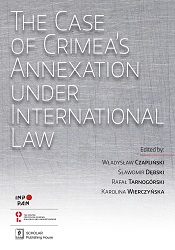The Legality of the EU Trade Sanctions Imposed on the Russian Federation under WTO Law
The Legality of the EU Trade Sanctions Imposed on the Russian Federation under WTO Law
Author(s): Łukasz Gruszczyński, Marcin Menkes
Subject(s): Law, Constitution, Jurisprudence, International Law
Published by: Wydawnictwo Naukowe Scholar Sp. z o.o.
Keywords: EU; GATS; GATT; Russia; sanctions; security exception; Ukraine; WTO
Summary/Abstract: The aim of this chapter is to assess the legality of the EU sanctions on Russia under WTO law. In this context, the authors claim, after providing a detailed description of the measures introduced by the EU, that some of the sanctions either fall outside the scope of WTO law (i.e. the travel bans and asset freezes of certain individuals that cannot be considered service providers) or are related to aspects which are not covered by specific commitments made by the EU (i.e. certain restrictions on financial transactions). Consequently, they cannot be deemed to constitute a breach of the General Agreement on Trade in Services. The authors also argue that those measures which fall within the scope of WTO law (e.g. bans on sale of dual-use equipment and oil industry technologies) and which may be regarded as incompatible with certain obligations (e.g. prohibition of quantitative restrictions introduced by Art. XI of the General Agreement on Tariffs and Trade), can still benefit from the justification provided by the security exceptions included in respective WTO agreements. In this context, the authors analyse the specific conditions envisaged by such exceptions. Special attention is paid to the meaning of two elements: (i) the clause requiring a sanction to be an ‘action which [a WTO Member] considers necessary for the protection of its essential security interests’ and (ii) the clause speaking about measures ‘taken in time of war or other emergency in international relations’. The authors observe that due to a lack of relevant WTO jurisprudence, it is difficult to ascertain the precise standards required by WTO law. Nevertheless, they come to the conclusion, by relying on the interpretation methods traditionally employed by the WTO dispute settlement bodies (textual, systemic and teleological interpretation as provided by Art. 31 of the Vienna Convention on the Law of Treaties supplemented by a reference to the preparatory work) and referring to the practice of other international courts, that the relevant provisions grant wide discretion to WTO Members. On that basis, the authors argue that specific sanctions imposed by the EU should be regarded as justified under WTO law.
Book: The Case Of Crimea’s Annexation Under International Law
- Page Range: 237-257
- Page Count: 21
- Publication Year: 2018
- Language: English
- Content File-PDF

